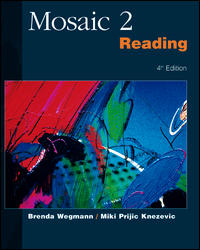

 Mosaic 2 Reading, 4/e The Future Anticipating the Reading |
 2003 McGraw-Hill Higher Education
2003 McGraw-Hill Higher EducationAny use is subject to the Terms of Use and Privacy Policy.
McGraw-Hill Higher Education is one of the many fine businesses of The McGraw-Hill Companies.
 |  | ||
| student Center | Instructor Center | Home | |||
| |||
 2003 McGraw-Hill Higher Education 2003 McGraw-Hill Higher EducationAny use is subject to the Terms of Use and Privacy Policy. McGraw-Hill Higher Education is one of the many fine businesses of The McGraw-Hill Companies. | |||